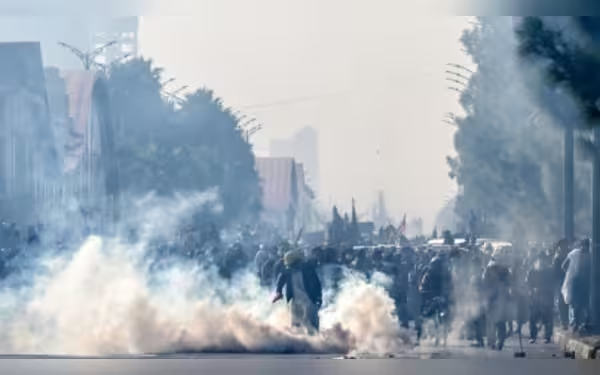Wednesday, December 4, 2024 07:22 PM
Protests Erupt in Islamabad as 1,000 Arrested Demanding Imran Khan's Release
- Nearly 1,000 protesters arrested in Islamabad.
- Imran Khan's supporters demand his release amid legal battles.
- Government faces criticism for heavy-handed approach to dissent.
 Image Credits: thepeninsulaqatar
Image Credits: thepeninsulaqatarNearly 1,000 protesters were arrested in Islamabad demanding Imran Khan's release, escalating political tensions in Pakistan.
In a significant escalation of political tensions in Pakistan, nearly 1,000 protesters were arrested in Islamabad during a large demonstration demanding the release of former Prime Minister Imran Khan. This protest, which took place on a Tuesday, marked one of the largest gatherings in the capital since the controversial elections held earlier this year. Imran Khan, who has been imprisoned since August 2023, faces numerous legal challenges that he claims are designed to thwart his political comeback.
The backdrop to this unrest is a series of legal battles that Khan has been embroiled in, which many of his supporters believe are politically motivated. His party, the Pakistan Tehreek-e-Insaf (PTI), has been actively organizing rallies despite a government crackdown aimed at suppressing dissent. On this particular day, over 10,000 demonstrators defied a lockdown and a ban on public gatherings, clashing with approximately 20,000 security personnel deployed to maintain order.
According to Islamabad Police Inspector General Ali Nasir Rizvi, 954 protesters were arrested between Sunday and Tuesday, as they attempted to reach a public square in the city. The government reported that the unrest resulted in the deaths of at least one police officer and four paramilitary personnel. In response to the escalating situation, security forces utilized tear gas and batons to disperse the crowds early Wednesday morning.
Interior Minister Mohsin Naqvi praised the actions of the security forces, stating that they had "bravely repulsed the protesters." Meanwhile, the PTI communicated through social media that the rally was canceled "for the time being," indicating a strategic retreat in the face of overwhelming force. Khan, from his prison cell, called on his supporters to gather in the capital, but the rally was ultimately led by key figures from his party, including Ali Amin Gandapur and his wife, Bushra Bibi.
Prime Minister Shehbaz Sharif condemned the protests, labeling them as "extremism." His government has faced increasing scrutiny for its heavy-handed approach to quelling dissent, with ministers holding press conferences to warn against the marchers. However, as the situation unfolded, there were rising calls for reconciliation to avoid further unrest that could adversely affect the daily lives of ordinary citizens in Pakistan.
The Human Rights Commission of Pakistan urged both Khan's and Sharif's parties to engage in "purposeful political dialogue," emphasizing the need for a peaceful resolution to the ongoing crisis. Michael Kugelman, a director at the South Asia Institute, remarked on social media that "Pakistan's protests had no winners," highlighting the growing anger towards the establishment while noting that the PTI was forced to retreat.
As the situation continues to develop, the implications for Pakistan's political landscape remain profound. The crackdown on protests and the ongoing legal battles surrounding Imran Khan have created a climate of uncertainty. With the country facing a population of 240 million, the need for dialogue and reconciliation is more pressing than ever. The future of Pakistan's democracy hinges on the ability of its leaders to navigate these turbulent waters and find common ground, ensuring that the voices of the people are heard and respected.













